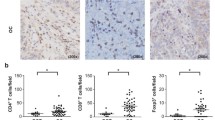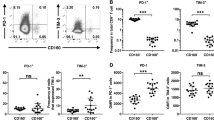Abstract
Background
CD8+Foxp3+ T lymphocytes have been detected in tumors. However, the distribution, phenotypic features, and regulation of these cells in gastric cancer remain unknown.
Methods
The levels of CD8+Foxp3+ T lymphocytes in the peripheral blood, tumor-draining lymph nodes, non-tumor tissues, and tumor tissues of patients with gastric cancer were detected by flow cytometry. Foxp3 induction in CD8+Foxp3− T cells was investigated in vitro. The suppressive function of CD8+Foxp3+ T lymphocytes was analyzed by their effect on CD4+ T-cell proliferation and IFN-γ production. The percentages of CD8+Foxp3+ T lymphocytes were evaluated for the association with tumor stage.
Results
The frequency of CD8+Foxp3+ T lymphocytes in tumor tissues was significantly higher than that in non-tumor tissues, and similar results were also observed in tumor-draining lymph nodes compared with peripheral blood. Most intratumoral CD8+Foxp3+ T lymphocytes were activated effector cells (CD45RA−CD27−). TGF-β1 levels were positively correlated with the frequency of CD8+Foxp3+ T lymphocytes in tumor tissues, and in vitro TGF-β1 could induce the generation of CD8+Foxp3+ T lymphocytes in a dose-dependent manner. Furthermore, intratumoral CD8+Foxp3+ T lymphocytes suppressed the proliferation and IFN-γ production of CD4+ T cells. Finally, intratumoral CD8+Foxp3+ T lymphocytes were significantly increased with tumor progression in terms of tumor-node-metastasis (TNM) stage.
Conclusions
Our data have shown that increased intratumoral CD8+Foxp3+ T lymphocytes are associated with tumor stage and potentially influence CD4+ T-cell functions, which may provide insights for developing novel immunotherapy protocols against gastric cancer.





Similar content being viewed by others
References
Jemal A, Bray F, Center MM, Ferlay J, Ward E, Forman D (2011) Global cancer statistics. CA Cancer J Clin 61(2):69–90
Galon J, Costes A, Sanchez-Cabo F, Kirilovsky A, Mlecnik B, Lagorce-Pagès C, Tosolini M, Camus M, Berger A, Wind P, Zinzindohoué F, Bruneval P, Cugnenc PH, Trajanoski Z, Fridman WH, Pagès F (2006) Type, density, and location of immune cells within human colorectal tumors predict clinical outcome. Science 313(5795):1960–1964
Sharma P, Shen Y, Wen S, Yamada S, Jungbluth AA, Gnjatic S, Bajorin DF, Reuter VE, Herr H, Old LJ, Sato E (2007) CD8 tumor-infiltrating lymphocytes are predictive of survival in muscle-invasive urothelial carcinoma. Proc Natl Acad Sci USA 104(10):3967–3972
Lee HE, Chae SW, Lee YJ, Kim MA, Lee HS, Lee BL, Kim WH (2008) Prognostic implications of type and density of tumour-infiltrating lymphocytes in gastric cancer. Br J Cancer 99(10):1704–1711
Shen Z, Zhou S, Wang Y, Li RL, Zhong C, Liang C, Sun Y (2010) Higher intratumoral infiltrated Foxp3+ Treg numbers and Foxp3+/CD8+ ratio are associated with adverse prognosis in resectable gastric cancer. J Cancer Res Clin Oncol 136(10):1585–1595
Campbell DJ, Koch MA (2011) Phenotypical and functional specialization of FOXP3(+) regulatory T cells. Nat Rev Immunol 11(2):119–130
Nishikawa H, Sakaguchi S (2010) Regulatory T cells in tumor immunity. Int J Cancer 127(4):759–767
Curiel TJ, Coukos G, Zou L, Alvarez X, Cheng P, Mottram P, Evdemon-Hogan M, Conejo-Garcia JR, Zhang L, Burow M, Zhu Y, Wei S, Kryczek I, Daniel B, Gordon A, Myers L, Lackner A, Disis ML, Knutson KL, Chen L, Zou W (2004) Specific recruitment of regulatory T cells in ovarian carcinoma fosters immune privilege and predicts reduced survival. Nat Med 10(9):942–949
Mizukami Y, Kono K, Kawaguchi Y, Akaike H, Kamimura K, Sugai H, Fujii H (2008) CCL17 and CCL22 chemokines within tumor microenvironment are related to accumulation of Foxp3+ regulatory T cells in gastric cancer. Int J Cancer 122(10):2286–2293
Shen LS, Wang J, Shen DF, Yuan XL, Dong P, Li MX, Xue J, Zhang FM, Ge HL, Xu D (2009) CD4(+)CD25(+)CD127(low/-) regulatory T cells express Foxp3 and suppress effector T cell proliferation and contribute to gastric cancers progression. C. Clin Immunol 131(1):109–118
Yuan XL, Chen L, Li MX, Dong P, Xue J, Wang J, Zhang TT, Wang XA, Zhang FM, Ge HL, Shen LS, Xu D (2010) Elevated expression of Foxp3 in tumor-infiltrating Treg cells suppresses T-cell proliferation and contributes to gastric cancer progression in a COX-2-dependent manner. Clin Immunol 134(3):277–288
Kim YJ, Lim J, Kang JS, Kim HM, Lee HK, Ryu HS, Kim JY, Hong JT, Kim Y, Han SB (2010) Adoptive immunotherapy of human gastric cancer with ex vivo expanded T cells. Arch Pharm Res 33(11):1789–1795
Klages K, Mayer CT, Lahl K, Loddenkemper C, Teng MW, Ngiow SF, Smyth MJ, Hamann A, Huehn J, Sparwasser T (2010) Selective depletion of Foxp3+ regulatory T cells improves effective therapeutic vaccination against established melanoma. Cancer Res 70(20):7788–7799
Cosmi L, Liotta F, Lazzeri E, Francalanci M, Angeli R, Mazzinghi B, Santarlasci V, Manetti R, Vanini V, Romagnani P, Maggi E, Romagnani S, Annunziato F (2003) Human CD8+CD25+ thymocytes share phenotypic and functional features with CD4+CD25+ regulatory thymocytes. Blood 102(12):4107–4114
Adams B, Dubois A, Delbauve S, Debock I, Lhommé F, Goldman M, Flamand V (2011) Expansion of regulatory CD8+ CD25+ T cells after neonatal alloimmunization. Clin Exp Immunol 163(3):354–361
Hahn BH, Singh RP, La Cava A, Ebling FM (2005) Tolerogenic treatment of lupus mice with consensus peptide induces Foxp3-expressing, apoptosis-resistant, TGFbeta-secreting CD8+ T cell suppressors. J Immunol 175(11):7728–7737
Filaci G, Bacilieri S, Fravega M, Monetti M, Contini P, Ghio M, Setti M, Puppo F, Indiveri F (2001) Impairment of CD8+ T suppressor cell function in patients with active systemic lupus erythematosus. J Immunol 166(10):6452–6457
Zhang L, Bertucci AM, Ramsey-Goldman R, Burt RK, Datta SK (2009) Regulatory T cell (Treg) subsets return in patients with refractory lupus following stem cell transplantation, and TGF-beta-producing CD8+ Treg cells are associated with immunological remission of lupus. J Immunol 183(10):6346–6358
Davila E, Kang YM, Park YW, Sawai H, He X, Pryshchep S, Goronzy JJ, Weyand CM (2005) Cell-based immunotherapy with suppressor CD8+ T cells in rheumatoid arthritis. J Immunol 174(11):7292–7301
Lee YH, Ishida Y, Rifa’i M, Shi Z, Isobe K, Suzuki H (2008) Essential role of CD8+CD122+ regulatory T cells in the recovery from experimental autoimmune encephalomyelitis. J Immunol 180(2):825–832
Chen ML, Yan BS, Kozoriz D, Weiner HL (2009) Novel CD8+ Treg suppress EAE by TGF-beta- and IFN-gamma-dependent mechanisms. Eur J Immunol 39(12):3423–3435
Menager-Marcq I, Pomie C, Romagnoli P, van Meerwijk JP (2006) CD8+CD28- regulatory T lymphocytes prevent experimental inflammatory bowel disease in mice. Gastroenterology 131(6):1775–1785
Billerbeck E, Thimme R (2008) CD8+ regulatory T cells in persistent human viral infections. Hum Immunol 69(11):771–775
Joosten SA, van Meijgaarden KE, Savage ND, de Boer T, Triebel F, van der Wal A, de Heer E, Klein MR, Geluk A, Ottenhoff TH (2007) Identification of a human CD8+ regulatory T cell subset that mediates suppression through the chemokine CC chemokine ligand 4. Proc Natl Acad Sci USA 104(19):8029–8034
Wang RF (2008) CD8+ regulatory T cells, their suppressive mechanisms, and regulation in cancer. Hum Immunol 69(11):811–814
Chaput N, Louafi S, Bardier A, Charlotte F, Vaillant JC, Ménégaux F, Rosenzwajg M, Lemoine F, Klatzmann D, Taieb J (2009) Identification of CD8+CD25+Foxp3+ suppressive T cells in colorectal cancer tissue. Gut 58(4):520–529
Kiniwa Y, Miyahara Y, Wang HY, Peng W, Peng G, Wheeler TM, Thompson TC, Old LJ, Wang RF (2007) CD8+Foxp3+ regulatory T cells mediate immunosuppression in prostate cancer. Clin Cancer Res 13(23):6947–6958
Li J, Huang ZF, Xiong G, Mo HY, Qiu F, Mai HQ, Chen QY, He J, Chen SP, Zheng LM, Qian CN, Zeng YX (2011) Distribution, characterization, and induction of CD8+ regulatory T cells and IL-17-producing CD8+ T cells in nasopharyngeal carcinoma. J Transl Med. doi:10.1186/1479-5876-9-189
Mayer CT, Floess S, Baru A, M. Lahl K, Huehn J, Sparwasser T (2011) CD8+Foxp3+ T cells share developmental and phenotypic features with classical CD4+Foxp3+ regulatory T cells but lack potent suppressive activity. Eur J Immunol 41(3):716–725
Chen YB, Hou JH, Feng XY, Chen S, Zhou ZW, Zhang XS, Cai MY (2012) Decreased expression of Beclin 1 correlates with a metastatic phenotypic feature and adverse prognosis of gastric carcinomas. J Surg Oncol 105(6):542–547
Xiong H, Du W, Wang JL, Wang YC, Tang JT, Hong J, Fang JY (2012) Constitutive activation of STAT3 is predictive of poor prognosis in human gastric cancer. J Mol Med. doi: 10.1007/s00109-012-0869-0
Zou W (2005) Immunosuppressive networks in the tumour environment and their therapeutic relevance. Nat Rev Cancer 5(4):263–274
Steer HJ, Lake RA, Nowak AK, Robinson BW (2010) Harnessing the immune response to treat cancer. Oncogene 29(48):6301–6313
Wang B, Xu D, Yu X, Ding T, Rao H, Zhan Y, Zheng L, Li L (2011) Association of Intra-tumoral Infiltrating Macrophages and Regulatory T Cells Is an Independent Prognostic Factor in Gastric Cancer after Radical Resection. Ann Surg Oncol. doi:10.1245/s10434-011-1609-3
Wang LX, Li Y, Yang G, Pang PY, Haley D, Walker EB, Urba WJ, Hu HM (2010) CD122+CD8+ Treg suppress vaccine-induced antitumor immune responses in lymphodepleted mice. Eur J Immunol 40(5):1375–1385
Wei S, Kryczek I, Zou L, Daniel B, Cheng P, Mottram P, Curiel T, Lange A, Zou W (2005) Plasmacytoid dendritic cells induce CD8+ regulatory T cells in human ovarian carcinoma. Cancer Res 65(12):5020–5026
Filaci G, Fenoglio D, Fravega M, Ansaldo G, Borgonovo G, Traverso P, Villaggio B, Ferrera A, Kunkl A, Rizzi M, Ferrera F, Balestra P, Ghio M, Contini P, Setti M, Olive D, Azzarone B, Carmignani G, Ravetti JL, Torre G, Indiveri F (2007) CD8+ CD28- T regulatory lymphocytes inhibiting T cell proliferative and cytotoxic functions infiltrate human cancers. J Immunol 179(7):4323–4334
Anichini A, Molla A, Vegetti C, Bersani I, Zappasodi R, Arienti F, Ravagnani F, Maurichi A, Patuzzo R, Santinami M, Pircher H, Di Nicola M, Mortarini R (2010) Tumor-reactive CD8+ early effector T cells identified at tumor site in primary and metastatic melanoma. Cancer Res 70(21):8378–8387
Enarsson K, Lundgren A, Kindlund B, Hermansson M, Roncador G, Banham AH, Lundin BS, Quiding-Järbrink M (2006) Function and recruitment of mucosal regulatory T cells in human chronic Helicobacter pylori infection and gastric adenocarcinoma. Clin Immunol 121(3):358–368
Liu VC, Wong LY, Jang T, Shah AH, Park I, Yang X, Zhang Q, Lonning S, Teicher BA, Lee C (2007) Tumor evasion of the immune system by converting CD4+CD25- T cells into CD4+CD25+ T regulatory cells: role of tumor-derived TGF-beta. J Immunol 178(5):2883–2892
Siegmund K, Rückert B, Ouaked N, Bürgler S, Speiser A, Akdis CA, Schmidt-Weber CB (2009) Unique phenotype of human tonsillar and in vitro-induced FOXP3+CD8+ T cells. J Immunol 182(4):2124–2130
Fleissner D, Frede A, Knott M, Knuschke T, Geffers R, Hansen W, Dobos G, Langhorst J, Buer J, Westendorf AM (2011) Generation and function of immunosuppressive human and murine CD8+ T cells by transforming growth factor-β and retinoic acid. Immunology 134(1):82–92
Acknowledgments
This work was supported by grants of the National Natural Science Foundation of China (NSFC, No. 81071412) and National Basic Research Program of China (973 program, No. 2009CB522606). We thank Fang Wang (Analysis and Testing Center) for her help in flow cytometry sorting.
Conflict of interest
The authors declare that they have no conflict of interest.
Author information
Authors and Affiliations
Corresponding authors
Additional information
Liu-sheng Peng and Yuan Zhuang contributed equally to the work.
Rights and permissions
About this article
Cite this article
Peng, Ls., Zhuang, Y., Shi, Y. et al. Increased tumor-infiltrating CD8+Foxp3+ T lymphocytes are associated with tumor progression in human gastric cancer. Cancer Immunol Immunother 61, 2183–2192 (2012). https://doi.org/10.1007/s00262-012-1277-6
Received:
Accepted:
Published:
Issue Date:
DOI: https://doi.org/10.1007/s00262-012-1277-6




